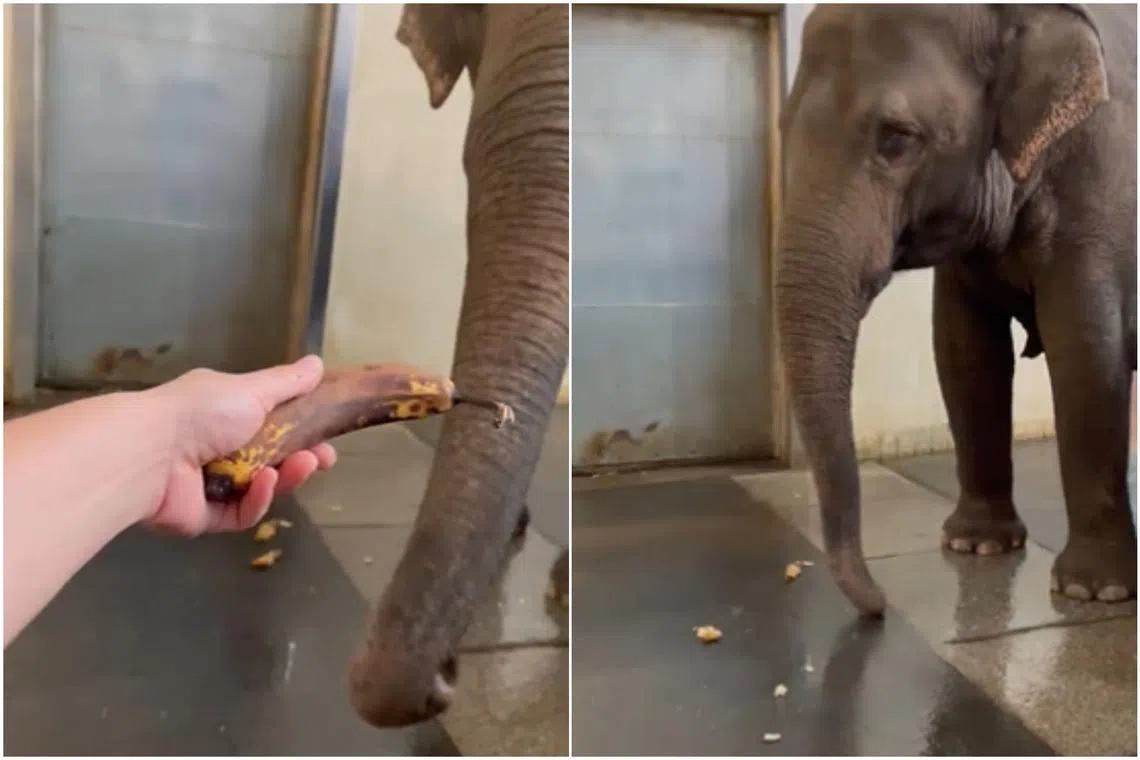This elephant in a Germany zoo taught herself to peel bananas
Sign up now: Get ST's newsletters delivered to your inbox

Researchers realised that she would peel only bananas that were at the right level of ripeness, seeming to prefer the yellow-brown ones.
PHOTOS: SCREENGRABS FROM LENA KAUFMANN/TWITTER
Follow topic:
BERLIN - Pang Pha is an elephant of discriminating taste. Offer her a yellow or green banana and she will hoover it up whole, peel and all. Proffer a brown banana and she is likely to turn her long nose up at it, casually tossing it aside.
But give this Asian elephant which lives at the Berlin Zoo a yellow banana speckled with brown, and she might do what none of her pachyderm companions do: peel it.
Pang Pha will snap the banana in half with the tip of her trunk and then shake the fruit until the fleshy interior slides out. Then she will devour the pulp, leaving the peel behind.
“It’s quite skillful,” said Dr Michael Brecht, a neuroscientist at Humboldt University of Berlin and one of the authors of a new paper on Pang Pha’s ability to peel that was published on Monday in the journal Current Biology.
“She clearly optimised the behaviour,” he added.
Dr Brecht and his colleagues suspect that the elephant which was raised at the zoo developed her method after watching her caretakers peel the fruit for her.
The behaviour is not unprecedented – there are anecdotal reports and online videos of other elephants peeling their fruit – and several outside experts said they were not convinced that Pang Pha had learned the habit from humans.
But her behaviour is interesting, scientists said, and highlights how skilled elephants are at manipulating objects.
“Banana peeling is another example of how dexterous the elephant’s trunk is,” said Mr Joshua Plotnik, a comparative psychologist at Hunter College in New York City, in an e-mail.
“It’s a wonderful ‘built in’ tool that the elephant uses for a variety of purposes.”
The study got off to a slow start.
After zookeepers told Dr Brecht, who studies elephant behaviour and neurobiology, about Pang Pha, researchers spent weeks plying her with bananas. But they never saw the signature peeling behaviour her keepers had promised.
“We would always bring the nicest banana we could find for her, and she would just never peel it,” said Dr Brecht.
Eventually the researchers realised that she would peel only bananas that were at the right level of ripeness, seeming to prefer the yellow-brown ones in particular.
That is probably because those very ripe bananas are easier to slide out of their peels, Dr Brecht said, although there are other potential explanations, too.
“The other thing that we thought of is that the brown peel might taste disgusting,” he said.
The researchers also found that her behaviour changed when she had to compete with other elephants for bananas.
When Pang Pha ate in group settings, she downed whole bananas as quickly as she could – one every two seconds, the scientists calculated – saving only the last one for peeling.
“If she has time, she clearly prefers the banana peeled,” said Dr Brecht.
None of the other elephants at the zoo have been seen peeling their fruit, despite the fact that some of them have watched Pang Pha do so repeatedly.
The researchers believe that her behaviour may stem from her unusual childhood experiences.
When Pang Pha arrived at the Berlin Zoo, she was hand-raised by a dedicated keeper, who strayed from the typical practice of doling out whole, unpeeled bananas.
“He thought it was stupid that they that they always eat the whole banana, and he peeled the bananas always for her,” Dr Brecht said.
“That’s where we think it started,” he added.
That early experience not only gave Pang Pha an opportunity to observe banana peeling but might have helped her develop a preference for the taste of peeled bananas, which the other elephants do not share, Dr Brecht said.
Still, Mr Richard Byrne, an expert on the evolution of cognitive and social behaviour at the University of St Andrews in Scotland, said that the evidence for observational learning was weak.
“She does not show anything like the same motor actions as people peeling bananas, nor could she do so,” he said in an e-mail.
“To me, this looks much more like a taste preference, with which I sympathise; and it makes good nutritional sense to avoid eating decayed skin where there is leisure to do so.”
Pang Pha’s daughter Anchali skips the peeling step, although she does sometimes benefit from the fruit of Pang Pha’s labour.
“Often”, Dr Brecht said, “Pang Pha would peel the banana and her daughter would eat the peel”. NYTIMES

